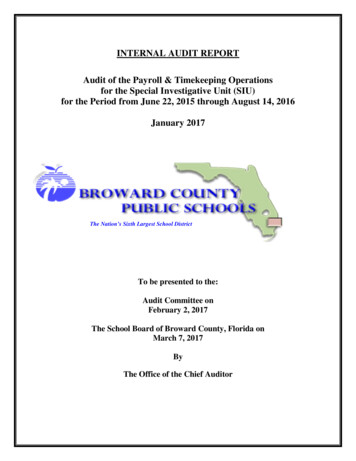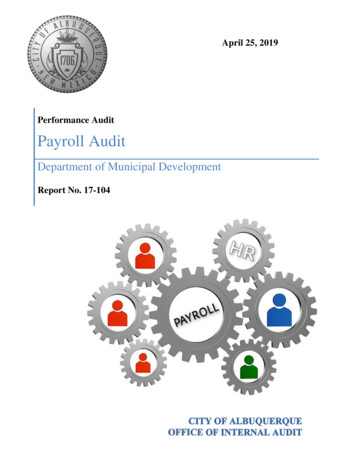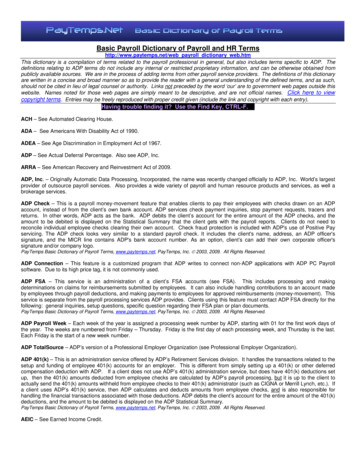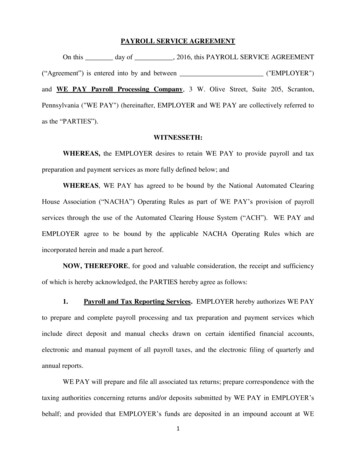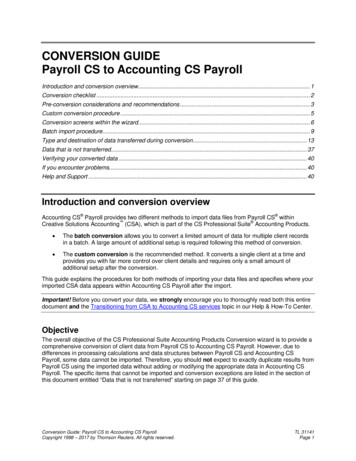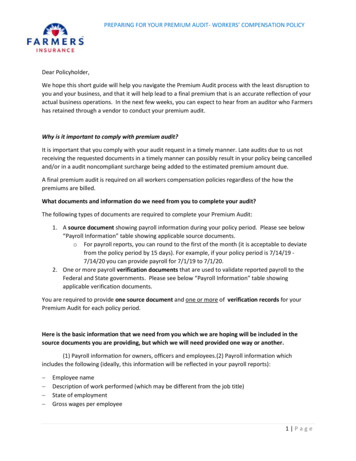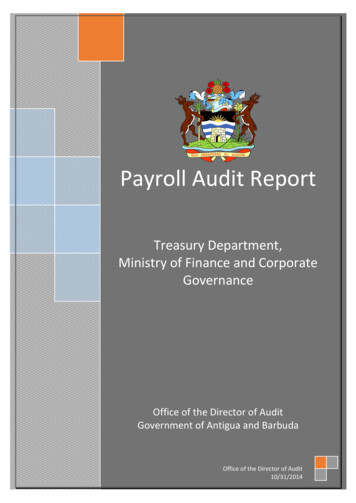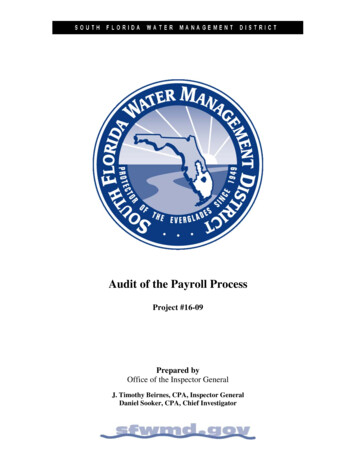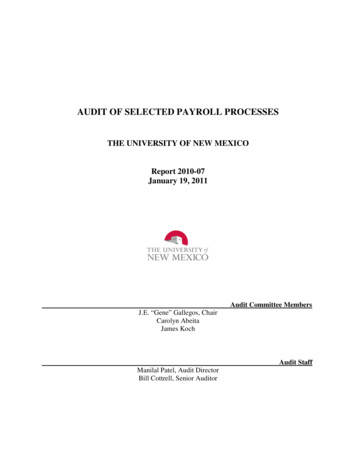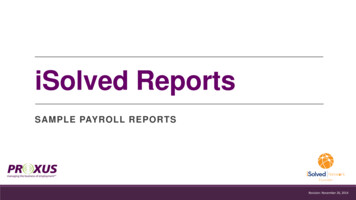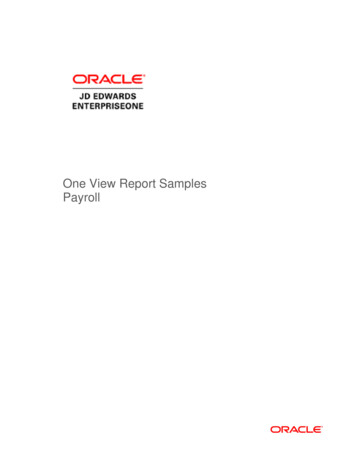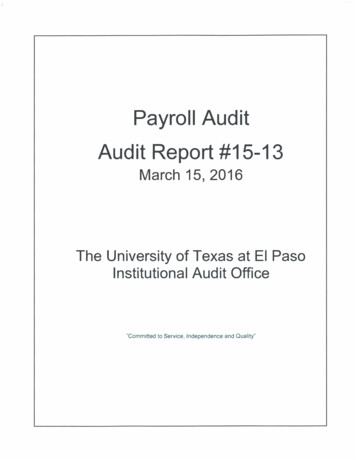
Transcription
Payroll AuditAudit Report #15-13March 15, 2016The University of Texas at El PasoInstitutional Audit Office"Committed to Service, Independence and Quality"
TH E UN IVERS I TYof TEXASUTIONS UN I,. T D POSSIBILIFOUR TEUTEP Institutional Audit Office500 West University Ave.SYSTEMEl Paso, Texas 79968915-747-5191 SWWW.UTEP.EDUWWW.UTSYSTEM.EDUMarch 15, 2016Dr. Diana NatalicioPresident, University of Texas at El PasoAdministration Building, Suite 500EI Paso, Texas 79968Dear Dr. Natalicio:The Office of Auditing and Consulting Services has completed a limited- scope audit ofthe Payroll Office. During the audit, we identified opportunities for improvement andoffered the corresponding recommendations in the audit report. The recommendationsare intended to assist the department in strengthening controls and help ensure that theUniversity's mission, goals and obj ectives are achieved.We appreciate the cooperation and assistance provided by the Payroll Office staffduring our audit.Sincerely,Lori WertzChief Audit ExecutiveThe University of Texas at ArlingtonThe University of Texas at Austin The University of Texas at Dallas·The University of Texas at El Paso ·The University of Texas of the Permian Basin·The University of Texas Rio Grande Valley The University of Texas at San Antonio· The University of Texas at TylerUniversity of Texas Medical Branch at Galveston· The University of Texas Health Science Center at HoustonThe University of Texas Southwestern Medical CenterTheThe University of Texas Health Science Center at San Antonio·The Universityof Texas MD Anderson Cancer Center The University of Texas Health Science Center at Tyler
Report Distribution:University of Texas at El PasoMr. Richard Adauto Ill, Executive Vice President and Interim Vice President forBusiness AffairsMr. Anthony Turrietta, Associate Vice President for Business Affairs and ComptrollerMs. Andrea Reveles, Payroll ManagerMs. Sandra Vasquez, Assistant Vice President for Equal Opportunity ( EO) andComplianceThe University of Texas System (UT System)UT System Audit OfficeExternalGovernor's Office of Budget, Planning and PolicyMr. Ed Osner, Legislative Budget BoardInternal Audit Coordinator, State Auditor's OfficeSunset Advisory CommissionAudit Committee MembersMr. David LindauMr. Steele JonesMr. Fernando OrtegaDr. Stephen RiterDr. Howard DaudistelDr. Roberto OseguedaAuditors Assigned to the AuditMr. Lorenzo Canales ( Project Manager)Ms. Sharon Delgado ( Lead Auditor)Ms. Victoria Morrison ( IT Auditor)
TA BLE OF CONTENTSEXECUTIVE SUMMARY . 1BACKGROUND . 2AUDIT OBJECTIVES . 2SCOPE AND METHODOLOGY . 3RANKING CRITERIA . 3AUDIT RES ULTS .4A. Off-Cycle Payroll . 4A1. Off-Cycle Payroll Checks . . . . . . . . . . . . . . . . . . . . . . . . . . . . . . . . . . . . . . . . . . . . . . . . . . . . . . . . . . . . . . . . . . . . . . . . . . . . .4A.2 Overpayments. 6A.3 Payroll FMLA Error .7B. Payroll. . . . . . . . . . . . . . . . . . . . . . . . . . . . . . . . . . . . . . . . . . . . . . . . . . . . . . . . . . . . . . . . . . . . . . . . . . . . . . . . . . . . . . . . . . . . . . . . . . . . . . . . . . . . . . . . . . . . . .B.1 Casual Labor. . . . . . . . . . . . . . . . . .B.2 Supplemental Pay. . . . . . . . . . . . . . . . . . . . . . . . . . . . . . . . . . . . . . . . . . . . . . . . . . . . . . . . . . . . . . . . . . . . . . . . . . . . . . . . . . . . . . . . . . . . . . . . . . . . . . . . . . . . . . . . . . . . . . . . . . . . . . . . . . . . . . . . . . . . . . . . . . . . . . . . . . . . . . . . . . . . . . . .889B.3 Overtime Pay .10C. Payroll Tax Reporting and Account Reconciliations. 12C1. Tax Reporting .12C.2 Payroll Account Reconciliations . 12D. Payroll IT Security Controls. 14D.1 Payroll Data Security . 14D.2 Payroll System Change Management . 15D.3 Segregation of Duties for Critical Operations .15CONCLUS ION . 16Appendix A: People Soft Initiative Summary Report .17
Office of Auditing and Consulting ServicesPayroll Audit Report #1 5-13EXECUTIVE SUMMARYThe Office of Auditing and Consulting Services has completed a limited scope audit ofthe Payroll Office. The objectives of the audit were to determine whether payrolloperations ensure the security, reliability and accuracy of payroll files and to determinecompliance with state, federal, and university policies and procedures, specifically: regular and off-cycle payroll processing, payroll reporting and account reconciliations, and payroll information technology control processes.Based on audit procedures applied and testing results, we have concluded the PayrollOffice processes can be enhanced with the recommendations noted in this report. Off-cycle checks should be limited so as not to create additional workloads andinefficiencies in payroll operations.Procedures should be developed to identify the causes, dollar amount, andstatus of overpayments.Auditors identified an error in Family Medical Leave Act ( FMLA) earningsreported for one employee. Auditors verified the employee did not receive anymonetary benefit from the error and the amount was reversed.Payroll should monitor trends in payroll data to help identify errors such asstudent overtime and other benefits.Support documentation should be maintained and reconciled to the supplementalpayroll to ensure payments are properly classified.Procedures should be developed to review overtime forms. These proceduresshould include recalculations and review of proper departmental approvals.Payroll should comply with UT System Policy 142.1 and University policies forthe reconciliation of accounts for which they have signature authority.Procedures should be established to secure and protect employee payrollinformation to ensure only authorized personnel have access to the Payroll Officerecords.1
Office of Auditing and Consulting ServicesPayroll Audit Report #1 5-1 3BACKGROUN DThe University of Texas at El Paso ( UTEP) Payroll Office is a dedicated team ofprofessionals committed to paying University employees timely and accurately,providing University employees with excellent customer service and to supportingUniversity efforts to achieve its mission. The Payroll Office supports UTEP in providingleadership in payroll practices, while remaining compliant with all federal and statepayroll regulations and being receptive and responsive to employee and departmentalneeds.In May 2014, UTEP entered the first phase of PeopleSoft ( PS) implementation, whichproved to be challenging to all departments. A key measure of success was thecompletion of the first payroll run. The Audit team anticipated that the implementation ofPeople Soft would create challenges for payroll control processes in place during theaudit period. The audit was done to assess payroll operations and identify opportunitiesfor enhancing Payroll Office effectiveness.AU DIT OBJECTIVESThe overall audit objective was to assess whether current payroll operations ensure thesecurity, reliability and accuracy of payroll files and to determine compliance withfederal, state, and university policies and procedures.The specific audit objectives were to determine whether: regular and off-cycle payroll was appropriate, correct, authorized, andsupported, payroll tax Form 941 reporting was appropriate and supported, payroll reconciliations were timely and had management review, and IT controls were appropriate and adequately safeguarded payroll information.2
Office of Auditing and Consulting ServicesPayroll Audit Report #1 5-1 3SCOPE AN D METHODOLOGYAudit procedures included identifying payroll processing risks, performing tests to verifythe effectiveness of internal controls, interviewing personnel and reviewing supportdocumentation to verify compliance with federal and state regulations and universitypolicies for the processing of payroll. The audit period included operations during theperiod May 1 , 201 4 through April 30, 201 5.Our audit was conducted in accordance with the International Standards for theProfessional Practice of Internal Auditing.RANKING CRITERIAAll findings in this report are ranked based on an assessment of applicable qualitative,operational control and quantitative risk factors, as well as the probability of a negativeoutcome occurring if the risk is not adequately mitigated. The criteria for the rankingsare as follows:Priority an issue identified by an internal audit that, if not addressed timely, could-directly impact achievement of a strategic or important operational objective of a UTinstitution or the UT System as a whole.High A finding identified by internal audit that is considered to have a medium to highprobability of adverse effects to the UT institution either as a whole or to a significantcollege/school/unit level.-Medium A finding identified by internal audit that is considered to have a low tomedium probability of adverse effects to the UT institution either as a whole or to acollege/ school/unit level.-LowA finding identified by internal audit that is considered to have minimal probabilityof adverse effects to the UT institution either as a whole or to a college/ school/unitlevel.-3
Office of Auditing and Consulting ServicesPayroll Audit Report #15-1 3AU DIT RESU LTSA. Off-Cycle PayrollOff-cycle checks may be requested for earnings that were to be paid on a priorscheduled payroll run but were not processed due to incomplete records and/orappointments. A separate off-cycle run calendar has been created to anticipate thedemand created by colleges/departments that continually request off-cycle checks. Dataanalytic techniques were applied for all off-cycle runs for the audit period May 1 , 201 4 toApril 30, 201 5 and identified off-cycle monitoring controls that require strengthening.A 1. Off-Cycle Payroll ChecksThe Payroll Office started identifying the reasons for off-cycle runs starting in February201 5 due to the large number of requests; however, the information was not conveyedto deans, chairs, or directors.During a five month period from February through June 201 5, the Payroll Office issued91 2 off-cycle checks. The Payroll Office has documented off-cycle runs by reason andcollege/department for the period. The charts below summarize the data by reason.504Appointment Submitted & Entered after Scheduled Pay RunEmployee Assignment Information was IncorrectHours Entered After Scheduled Payroll RunOther4
Office of Auditing and Consulting ServicesPayroll Audit Report #15-13The chart below illustrates the top five colleges/departments with off-cycle checkrequests for the five month period that was provided by the Payroll Office. 7; l'V ,· )orI Coll!geof EngineeringI Collel)1 of Heoltn ScieoceI College of Liller Arts1 Colffiq1! of ScienceI Provo aoo VP AcMemk Att rsDocumentation for July and August was requested but was not provided at the time ofthe report.Delayed entry of new hires or changes in employee records in PS is a major cause foroff-cycle payroll runs. This creates additional risks for the University, such as individualsworking without an official appointment, background check and insurance coverage.These issues are the result of college/department staff inefficiencies in creating andprocessing appointment actions in PS.OACS had previously reported on these same off-cycle payroll observations, along withrecommendations to senior management, in the PS Business Process Initiativemanagement letter dated July 31, 2013. See Appendix A: PeopleSoft Business ProcessInitiative-Summary Report.Recommendation:Payroll off-cycle runs should be limited so as to not create additional workloads andinefficiencies in payroll operations. Trainings can also be developed and targeted tocolleges/department who are regularly requesting off-cycle payroll checks. Criteria forprocessing off-cycle requests should be strictly adhered to and communicated to allcollege and department timekeepers along with deans, chairs and directors.Level: This finding is considered High due to the potential level of risk from lack ofcompliance with policies and procedures.Management Response:Agree. Off-cycle processing is currently being tracked by the payroll departmenton a monthly basis, and reported to VPBA office. The monthly report provides abreakdown of requests by CollegeNP/Division, and reason for the request. With theapproval of University Executive Management, off-cycle processing will be limitedto once per week. Criteria for processing an off-cycle payment is currentlyavailable on the payroll website at http://admin.utep.edu/Default.aspx?tabid 57995.5
Office of Auditing and Consulting ServicesPayroll Audit Report #1 5-13During the month of January the HR/Budget/Payroll group conductedpresentations with all colleges and divisions. The training covered the topic of offcycle requests and processing requirements and/or restrictions.Responsible Party:Andrea Reveles, Payroll ManagerImplementation Date:September 1, 2016A.2 OverpaymentsOverpayments in employee pay are corrected during off-cycle runs and identifiedthrough departmental account reconciliations and/or notification by the employee ordepartment. Situations contributing to overpayments include, but are not limited to,delays in processing assignment changes for employees, separation from theuniversity, data entry errors and changes in work schedule. After the department oremployee notifies the Payroll Office of an overpayment, a correction is processed in PSand recovery of the overpayment is initiated.The dollar amount and causes of overpayments for the audit period were requested,however, the Payroll Office does not track this information. At the request of InternalAudit, the Payroll Office created a series of queries to try to identify all overpaymentssince the implementation of PS. Based on these queries, the Payroll Office hascorrected a total of 958,699 in overpayments, of which 954,31 0 has been recovered.Support documentation was not provided for these amounts; consequently; auditorswere not able to validate the overpayment information.Recommendation:The Payroll Office should develop procedures to identify the causes, dollar amount, andthe status of overpayments. A process should be developed to record and track allpayroll overpayment exceptions, and this information should be communicated todeans, chairs and directors with recurring overpayments. Trainings can be developedand targeted to college/department timekeepers requiring additional support inprocessing employee appointment actions in P S.Level: This finding is considered High due to the potential level of risk from lack ofmonitoring and support documentation.6
Office of Auditing and Consulting ServicesPayroll Audit Report #15-13Management Response:Agree. The Payroll Office has developed queries to identify overpayments. Thequeries will provide breakdowns of overpayment occurrences byCollegeNP/Division, and a description detailing reasons for overpayments. Asummary will be provided to the VPBA Office on a monthly basis.Responsible Party:Andrea Reveles, Payroll ManagerImplementation Date:March 15, 2016A.3 Payroll F M LA ErrorDuring the testing of overpayment corrections, OACS identified an error in FamilyMedical Leave Act ( FMLA) reported earnings in the amount of 1 ,1 24,644.23 for oneemployee. Auditors verified the employee did not receive any monetary benefit from theerror and the amount was reversed.The Payroll Office directed us to Human Resources (HR) for additional information. Wewere told that the FMLA reported amount may have been caused by a PS system errorand there was no impact on the employee FMLA records.OACS reached out for assistance from the UTEP Director of PS for an explanation.After consultation with UT Share Service Desk Support, they indicated that it was a dataentry error and not a PS system error.7
Office of Auditing and Consulting ServicesPayroll Audit Report #15-13B. PayrollThe payroll cycle includes the functions involved in paying employees and determiningtheir proper classification compensation.B. 1 Casual LaborPer Human Resources, the casual labor job code is to be used for jobs that areperformed for a short and specific time period. It should only be used for persons whodo not require an appointment and are paid on a timesheet, as it is a non-benefit statusposition.Flat rate payments cannot be processed in PS; consequently, after the conversion, thecasual labor job code was used to pay individuals requiring a flat rate by converting thepayment into "hours" that could be entered into a timesheet. Several individualsassigned the casual labor job code already had active appointments in PS. Thisresulted in these individuals receiving vacation and sick leave benefits, retirementcontributions, and overtime.One specific case reviewed included the following issues: A student held two positions in different departments, one of which was casuallabor, without the proper approvals. The combination of hours entered into PS by the different departments resultedin the student receiving overtime payments on two separate occasions. Because the hours were entered by different departments, neither departmentwas aware of the fact that the student received overtime, therefore, there was noprior approval for the overtime payment.The amounts were not material; however, monitoring controls did not identify errorsoccurring in payroll processing of casual labor.Recommendation:The Payroll Office needs to monitor trends in payroll data to help identify anomaliesin payroll information such as students receiving overtime and other benefits.Level:This finding is considered Medium due to the potential level of risk from lack ofmonitoring.8
Office of Auditing and Consulting ServicesPayroll Audit Report #15-13Management Response:Agree. Monitoring of employee hours and entry of time is done at departmentlevel. The current set up in PeopleSoft allows submission of hours by thedepartmental timekeepers, and there is currently no method for electronicapproval/confirmation by supervisors. Once a timesheet is submitted, it feedsdirectly into payroll. We anticipate that PeopleSoft Time & Labor Work Flow willimprove this process. This is currently scheduled for roll-out in September 2016.The HR department can identify hourly employees who hold more than oneposition simultaneously and ca
Payroll Audit Report #15-13 During the month of January the HR/Budget/Payroll group conducted presentations with all colleges and divisions. The training covered the topic of off cycle requests and processing requirements and/or restric
